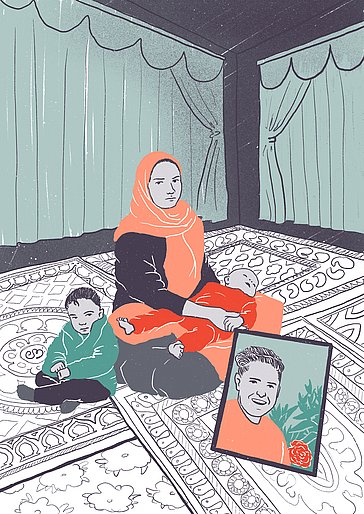
AFGHANISTAN
Return with fatal consequences
Adnan (†) and Amira Saber: Afghanistan - Germany - Afghanistan
In autumn 2015, they came to Germany together from the Afghan city of Herat: the young couple Adnan and Amira Saber with their first child Tara* and Adnan’s father. In October 2015, they applied for asylum in a small town in eastern Germany.
Their desire? To arrive, find a safe place for the future and be able to look ahead. Adnan and Amira hoped for support from relatives in Hamburg. But they soon realised that they would not get the help they needed to cope with residence issues, neither from their family nor from independent counselling centres.
Rejection of the application for asylum
The authorities were neither interested in the family’s current living conditions nor their plans for the future and completely misjudged their reasons for fleeing. One day in autumn 2016, Adnan and Amira were shocked to receive the negative decision regarding their asylum. It said: “Taking into account the statements made regarding refugee protection, it is not apparent that the applicants would face the death penalty if they returned to Afghanistan. Nor are there any indications that the applicants would be seriously harmed through torture or inhuman or degrading treatment after their return. A need for protection could not be established under § 4, para. 1, no. 3 of the German Asylum Act, either. (...) The applicants were said to not have to fear any serious individual threat to their lives or their integrity because, as civilians, they are not affected by arbitrary violence in the context of an internal armed conflict in their country of origin. (...) The applicants are not exposed to any individual threat of danger with regard to their return to their home city of Herat.”
At the hearing, Adnan said that he had been threatened in Herat and explained the reasons why. Threatening phone calls and burning petrol cans in the courtyard had been intended to be clear signals. After he had informed the local public prosecutor about this, the prosecutor himself had him arrested. Adnan was then released for a ransom. In Germany, the authorities did not recognise any of this as grounds for asylum. Adnan’s father’s case was different: he, too, said that he had been threatened in Herat. His application for asylum was granted.
Adnan and Amira could have filed an appeal against the asylum decision. In view of the positive decision regarding residence for Adnan’s father, the prospects would even have been good. But the two did not yet speak German well, were not aware of their legal options and were very afraid of being forcibly deported by the police. Although Amira was pregnant again, the government immigration authority did not offer any additional options for the couple - except one: voluntary return. Ultimately, it was the limited access to independent legal advice that led the family to accept return to Afghanistan in 2017.
Back in Herat - the disaster unfolds
At the end of 2017, the family of three said goodbye to Adnan’s father and flew back to the Herat region. They faced difficulties upon their arrival. Although the two couples had received around 500 Euro per person as part of the return programme, the money was soon used up and neither Adnan nor Amira found any work. They obtained temporary accommodation with relatives, and soon their second child was born. But they knew they were in constant danger and rarely left the house. In April 2019 - Adnan was on his moped on the way back from the market where he had bought food for the family - someone hit him on the back of the head with a piece of wood. He died a short time later as a result of the blow. There are many indications that the persons who murdered him were also responsible for the threats made against him before his time in Germany. They are members of a militarised group that often works with the Taliban and rules over a village south of Herat.
Adnan left behind his wife and two children. For Amira, the situation has become more uncertain than ever since her husband’s death. No sooner had she filed a complaint for her husband’s murder than she received a letter: Her dead husband owed money and she had to pay the debt. Adnan’s father, still in Germany and in deep mourning for his son, now fears the worst for his daughter-in-law. It cannot be ruled out that she will be forced into marriage to pay off the debts. For this reason, Amira and the children are currently living with distant relatives. Since Adnan’s death, she has not received any financial, legal or psychosocial support. She does not know what to do next.
* The names have been changed by the editors.
